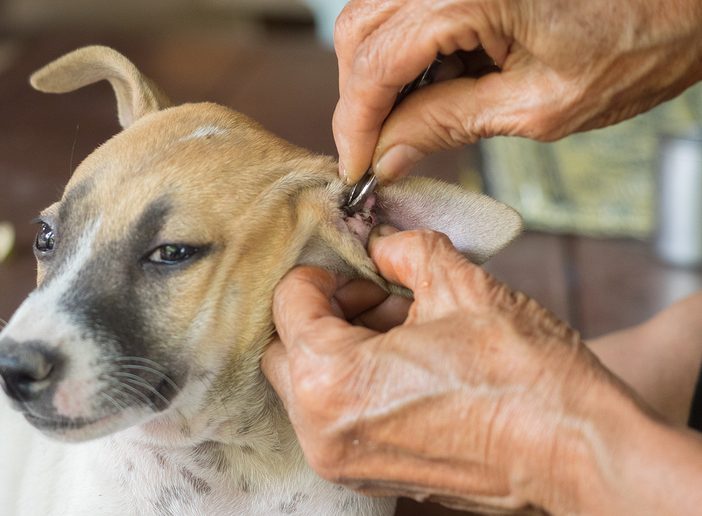
When the topic of heartworm and flea/tick preventatives comes up during an appointment, sometimes it feels like there’s an elephant in the room.
Often at this time of year, with talk of blizzards, cyclones, and polar vortexes, the answer to the question, “Do you need more flea-tick or heartworm preventatives?” is something like: “No, we’re good for a couple months.” or maybe it’s just a pleasant nod and a hastily mumbled “Yup.”
But is fall and winter really a reason to stop using preventatives? Is it worth saving money by saving doses? We are often accused in veterinary medicine of pushing products people don’t really need and especially now when we “don’t really need them.”
I have had dog owners tell me point blank that “everyone” knows ticks aren’t a problem from about September until April. According to a 2017 article in Parasites and Vectors that gathered data from over 500 clients, an average of only six months worth of flea and tick prevention was used over the course of a year for their dogs. This equates to use from about April to October or May to November. Sound familiar? It’s tick season, right?
Well, following are a couple myths I will debunk to suggest reconsidering the idea of “tick season”:
1. When the first killing frost comes in the Fall, all the ticks (and other insects) are all dead until Spring
My mom, a Master Gardener (a group at high risk for tick-borne diseases), attended a tick symposium. The main speaker described literally putting a tick into an ice cube tray filled with water and putting it in the freezer. Later, the ice cube containing the tick was removed and placed at room temperature. Once the ice cube melted, the tick simply crawled away to go back about its business.
If it’s above freezing for more than one day, I have seen ticks come right back out of their “hibernation” and go right back to business. Last year, I pulled three ticks off a dog in the middle of February during a warm stretch.
2. Ticks are seasonal, like birds. When Fall comes, they go “somewhere”.
Many people seem to feel that once the days get shorter and those Halloween decorations come out or people start shopping for Thanksgiving turkeys, that ticks kind of pack up their stuff and either go vacation somewhere warmer, or go bury themselves in a hole for a couple of months. But ticks don’t have any concept about seasons, or holidays. They have no idea what month it is. What they adapt to is ambient temperature.
I live in the Washington D.C. area and in our region, the ambient temperature varies quite a lot from fall into spring. In early January, temperatures were in the single digits for a whole week. However, once the polar vortex ran its course, we had about two days of balmy weather. When I drove to work one morning, only two days after scraping ice off my car, it was 60 degrees! (And a client told me that very day she didn’t need more preventatives because “it’s winter.”)
3. My dog doesn’t really go outside much during the winter so there’s no risk for ticks.
When I worked for a boarding kennel on the weekends as a teenager, I remember hosing down dog runs and finding plump, engorged ticks by the dozens trying to scramble along the drainage grate. While it might have been frigid outside, it was a balmy 75 and humid in the kennel, with plenty of warm bodies and clearly no preventatives given to deter them.
Playing the Game
We have a hard enough time accurately predicting the weather, so If you try to play the game of predicting when flea and tick season starts and ends, it’s a game you will eventually lose.
Lyme disease is the most common infectious disease I diagnose and every time I do, the owner is genuinely surprised. However, when I ask some questions, there’s always a gap somewhere, whether in preventatives or the vaccine interval.
I think many new cases of tick-borne diseases, like Lyme, occur during those transition periods between seasons, and during colder months when there are stretches of not-so-cold weather and people let their guard down. And remember, ticks infect people too, so don’t let your own guard down either.
So please, we’re not after your money. Unless you can guarantee me that it stays below freezing where you live every single day for six months, there really are good reasons to keep your pets on flea, tick, and heartworm preventatives year-round.
ABOUT THE AUTHOR

Dr. Chris Vanderhoof is a 2013 graduate of the Virginia-Maryland Regional College of Veterinary Medicine (VMRCVM) at Virginia Tech, where he also earned a Masters in Public Health. He completed a rotating internship with Red Bank Veterinary Hospital in New Jersey and now works as a general practitioner in the Washington D.C. area.
Dr. Vanderhoof is also a copywriter specializing in the animal health field and founder of Paramount Animal Health Writing Solutions, which can be found at www.animalhealthcopywriter.com. Dr. Vanderhoof lives in the Northern Virginia area with his wife, daughter, and 3 cats.